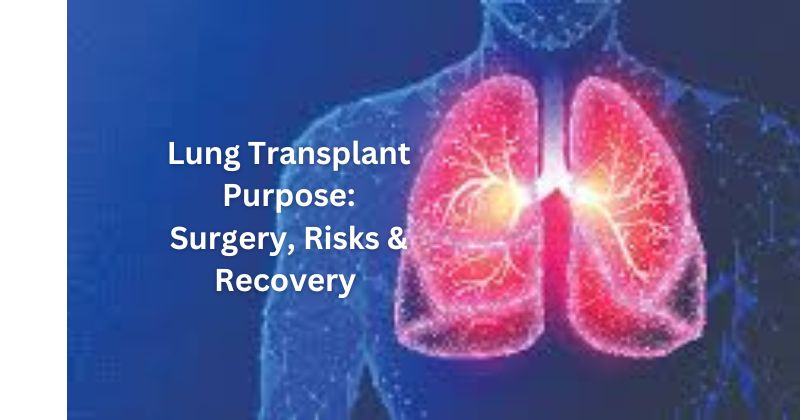A lung transplant is a complex and life-saving procedure that offers hope for patients suffering from advanced lung disease. It involves replacing a patient’s diseased lungs with healthy ones from a donor, and it is typically considered when other treatment options have failed. Lung transplant surgery is a critical intervention for individuals with severe respiratory failure or terminal lung conditions. In this blog, we will explore the purpose of lung transplant surgery, its costs, success rates, and recovery, with a particular focus on the procedure in India.
Purpose of Lung Transplant Surgery
Lung transplant surgery aims to improve the quality of life and prolong the life of end-stage lung disease patients. Some of the primary conditions that may require a lung transplant include:
- Chronic Obstructive Pulmonary Disease (COPD): A progressive lung disease that causes difficulty breathing.
- Pulmonary Fibrosis: A condition where lung tissue becomes scarred, leading to severe breathing difficulties.
- Cystic Fibrosis: A genetic disorder that causes mucus buildup in the lungs, leading to chronic respiratory infections.
- Emphysema: A form of COPD that causes damage to the air sacs in the lungs.
- Lung Cancer: In some cases of advanced, non-metastatic cancer, lung transplant surgery can offer a solution.
- Alpha-1 Antitrypsin Deficiency: A genetic condition that can lead to lung and liver disease.
The purpose of lung transplant surgery is to replace the diseased lungs with a donor’s healthy lungs, thereby improving lung function and enhancing the patient’s ability to breathe. For many patients, lung transplants are the last resort when all other treatments have failed, and they offer a chance to lead a more normal life.
Lung Transplant Surgery Procedure
Lung transplant surgery is a highly intricate and life-threatening procedure that requires careful planning and skilled medical teams. The process involves several critical stages:
- Pre-Operative Assessment: Before undergoing lung transplant surgery, the patient undergoes a thorough evaluation to determine their eligibility. This includes blood tests, imaging studies (such as CT scans or X-rays), and pulmonary function tests. The team of doctors assesses the patient’s overall health, including heart function, as the lungs and heart work in tandem.
- Finding a Suitable Donor: Once a patient is deemed eligible for a transplant, they are placed on a waiting list for a donor’s lung. Donor lungs are typically matched based on blood type, size, and other factors. The waiting time for a donor’s lung can vary, and patients may need to be prepared for a potentially long wait.
- Surgical Procedure: Lung transplant surgery is performed under general anesthesia. The surgeon removes the patient’s diseased lungs and replaces them with the donor lungs. The surgery can take anywhere from 4 to 12 hours, depending on whether it is a single-lung or double-lung transplant. The surgeon may opt for a traditional approach, where the chest is opened through a large incision, or a less invasive method, such as video-assisted thoracoscopic surgery (VATS), depending on the patient’s condition.
- Post-Operative Care: After the surgery, the patient is closely monitored in an intensive care unit (ICU) for any signs of complications, such as infection or rejection. Patients will remain in the hospital for several days or weeks, depending on their recovery progress.
Risks of Lung Transplant Surgery
Lung transplant surgery, while offering life-saving benefits, comes with several risks. Some of the most common risks include:
- Rejection: The body’s immune system may recognize the transplanted lungs as foreign and try to reject them. To prevent rejection, patients must take immunosuppressive drugs for the rest of their lives. These medications weaken the immune system and increase the risk of infections.
- Infection: Transplant patients are highly susceptible to infections due to the use of immunosuppressive drugs, which lower the body’s ability to fight off bacteria, viruses, and fungi.
- Chronic Lung Allograft Dysfunction (CLAD): This condition can develop over time and causes the transplanted lungs to lose their function. CLAD is one of the leading causes of death in lung transplant recipients.
- Blood Clots: There is a risk of blood clots forming in the lungs or veins during or after the surgery.
- Surgical Complications: As with any major surgery, there are risks associated with anesthesia, bleeding, and damage to surrounding tissues.
Lung Transplant Surgery Success Rate
The success rate of lung transplant surgery has significantly improved over the years, thanks to advances in surgical techniques and post-operative care. However, the success of the surgery largely depends on several factors, such as the patient’s age, overall health, the condition being treated, and the quality of the donor’s lungs.
- One-year Survival Rate: According to the International Society for Heart and Lung Transplantation (ISHLT), the one-year survival rate for lung transplant patients is approximately 85-90%.
- Five-year Survival Rate: The five-year survival rate is around 50-60%, though it can vary depending on the individual’s condition and complications.
- Long-Term Success: Some patients have lived for 10 years or more after a lung transplant, but this is not the case for everyone. Long-term success depends on careful monitoring, lifestyle changes, and adherence to medications.
Lung Transplant Cost
The cost of a lung transplant can vary widely depending on the country, hospital, and other factors. On average, lung transplant surgery can cost anywhere from $250,000 to $1,000,000 in the United States, which includes pre-surgical tests, surgery, and post-operative care. This figure can be significantly lower in other countries, including India.
Lung Transplant Surgery in India
India has become a sought-after destination for medical treatments, including lung transplant surgery, due to its high-quality healthcare system and affordable medical costs. Several hospitals in India are equipped with world-class infrastructure and skilled surgeons who perform lung transplants with a high degree of success.
Lung Transplant Surgery Cost in India
The cost of lung transplant surgery in India is significantly lower than in Western countries. On average, lung transplant surgery in India can cost anywhere from $25,000 to $40,000, making it an attractive option for international patients. This includes the costs for surgery, donor lungs, pre-surgical evaluations, hospitalization, and post-operative care. The cost may vary depending on the hospital, location, and other factors.
Many international patients prefer India for lung transplants because the country offers quality care at a fraction of the cost. Additionally, patients can expect treatment from highly experienced surgeons with expertise in performing complex transplant surgeries.
Recovery After Lung Transplant Surgery
Recovery from lung transplant surgery is a gradual process that requires careful monitoring and rehabilitation. After the surgery, patients are closely monitored for signs of rejection or infection. They will need to stay in the hospital for several weeks and may require ventilator support initially.
Once discharged, patients need to undergo regular follow-ups to monitor the health of their new lungs. They will also need to follow a strict regimen of medications, including immunosuppressive drugs to prevent rejection, as well as antibiotics to prevent infections.
Patients must make lifestyle changes, including:
- Quitting smoking (if applicable)
- Maintaining a healthy diet to prevent weight gain or malnutrition
- Physical therapy to improve lung function
- Psychological support to deal with the emotional challenges of post-transplant life
Conclusion
Lung transplant surgery is a transformative procedure that offers a new lease on life for individuals suffering from severe lung diseases. While the surgery comes with risks and significant costs, especially in countries like the United States, India provides an affordable and high-quality alternative for many patients. The success rates for lung transplant surgery have improved, and with proper post-operative care, many recipients can enjoy years of improved quality of life. If you or someone you know is considering lung transplant surgery, it is crucial to consult with a medical professional to understand the best treatment options and the costs involved.
For more(click here)





